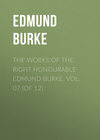Loe raamatut: «Selections from the Speeches and Writings of Edmund Burke», lehekülg 20
WHAT A MINISTER SHOULD ATTEMPT
After such an elaborate display had been made of the injustice and insolence of an enemy, who seems to have been irritated by every one of the means which had been commonly used with effect to soothe the rage of intemperate power, the natural result would be, that the scabbard, in which we in vain attempted to plunge our sword, should have been thrown away with scorn. It would have been natural that, rising in the fulness of their might, insulted majesty, despised dignity, violated justice, rejected supplication, patience goaded into fury, would have poured out all the length of the reins upon all the wrath which they had so long restrained. It might have been expected that, emulous of the glory of the youthful hero in alliance with him, touched by the example of what one man, well formed and well placed, may do in the most desperate state of affairs, convinced there is a courage of the cabinet full as powerful, and far less vulgar than that of the field, our minister would have changed the whole line of that useless, prosperous prudence, which had hitherto produced all the effects of the blindest temerity. If he found his situation full of danger (and I do not deny that it is perilous in the extreme), he must feel that it is also full of glory; and that he is placed on a stage, than which no muse of fire that had ascended the highest heaven of invention could imagine anything more awful and august. It was hoped that, in this swelling scene in which he moved with some of the first potentates of Europe for his fellow-actors, and with so many of the rest for the anxious spectators of a part, which, as he plays it, determines for ever their destiny and his own, like Ulysses in the unravelling point of the epic story, he would have thrown off his patience and his rags together; and, stripped of unworthy disguises, he would have stood forth in the form and in the attitude of a hero. On that day it was thought he would have assumed the port of Mars; that he would bid to be brought forth from their hideous kennel (where his scrupulous tenderness had too long immured them) those impatient dogs of war, whose fierce regards affright even the minister of vengeance that feeds them; that he would let them loose, in famine, fever, plagues, and death, upon a guilty race, to whose frame, and to all whose habit, order, peace, religion, and virtue are alien and abhorrent. It was expected that he would at last have thought of active and effectual war; that he would no longer amuse the British lion in the chase of mice and rats; that he would no longer employ the whole naval power of Great Britain, once the terror of the world, to prey upon the miserable remains of a peddling commerce, which the enemy did not regard, and from which none could profit. It was expected that he would have re-asserted the justice of his cause; that he would have re-animated whatever remained to him of his allies, and endeavoured to recover those whom their fears had led astray; that he would have rekindled the martial ardour of his citizens; that he would have held out to them the example of their ancestry, the assertor of Europe, and the scourge of French ambition; that he would have reminded them of a posterity, which, if this nefarious robbery under the fraudulent name and false colour of a government, should in full power be seated in the heart of Europe, must for ever be consigned to vice, impiety, barbarism, and the most ignominious slavery of body and mind. In so holy a cause it was presumed that he would (as in the beginning of the war he did) have opened all the temples; and with prayer, with fasting, and with supplication (better directed than to the grim Moloch of regicide in France), have called upon us to raise that united cry which has so often stormed heaven, and with a pious violence forced down blessings upon a repentant people. It was hoped that when he had invoked upon his endeavours the favourable regard of the Protector of the human race, it would be seen that his menaces to the enemy, and his prayers to the Almighty, were not followed, but accompanied, with correspondent action. It was hoped that his shrilling trumpet should be heard, not to announce a show, but to sound a charge.
LAW OF VICINITY
This violent breach in the community of Europe we must conclude to have been made (even if they had not expressly declared it over and over again) either to force mankind into an adoption of their system, or to live in perpetual enmity with a community the most potent we have ever known. Can any person imagine, that, in offering to mankind this desperate alternative, there is no indication of a hostile mind, because men in possession of the ruling authority are supposed to have a right to act without coercion in their own territories. As to the right of men to act anywhere according to their pleasure, without any moral tie, no such right exists. Men are never in a state of TOTAL independence of each other. It is not the condition of our nature: nor is it conceivable how any man can pursue a considerable course of action without its having some effect upon others; or, of course, without producing some degree of responsibility for his conduct. The SITUATIONS in which men relatively stand produce the rules and principles of that responsibility, and afford directions to prudence in exacting it. Distance of place does not extinguish the duties or the rights of men; but it often renders their exercise impracticable. The same circumstance of distance renders the noxious effects of an evil system in any community less pernicious. But there are situations where this difficulty does not occur; and in which, therefore, these duties are obligatory, and these rights are to be asserted. It has ever been the method of public jurists to draw a great part of the analogies, on which they form the law of nations, from the principles of law which prevail in civil community. Civil laws are not all of them merely positive. Those, which are rather conclusions of legal reason than matters of statutable provision, belong to universal equity, and are universally applicable. Almost the whole praetorian law is such. There is a "Law of Neighbourhood" which does not leave a man perfectly master on his own ground. When a neighbour sees a NEW ERECTION, in the nature of a nuisance, set up at his door, he has a right to represent it to the judge; who, on his part, has a right to order the work to be stayed; or, if established, to be removed. On this head the parent law is express and clear, and has made many wise provisions, which, without destroying, regulate and restrain the right of OWNERSHIP, by the right of VICINAGE. No INNOVATION is permitted that may redound, even secondarily, to the prejudice of a neighbour. The whole doctrine of that important head of praetorian law, "De novi operis nunciatione," is founded on the principle, that no NEW use should be made of a man's private liberty of operating upon his private property, from whence a detriment may be justly apprehended by his neighbour. This law of denunciation is prospective. It is to anticipate what is called damnum infectum, or damnum nondum factum, that is, a damage justly apprehended, but not actually done. Even before it is clearly known whether the innovation be damageable or not, the judge is competent to issue a prohibition to innovate, until the point can be determined. This prompt interference is grounded on principles favourable to both parties. It is preventive of mischief difficult to be repaired, and of ill blood difficult to be softened. The rule of law, therefore, which comes before the evil, is amongst the very best parts of equity, and justifies the promptness of the remedy; because, as it is well observed, Res damni infecti celeritatem desiderat, et periculosa est dilatio. This right of denunciation does not hold, when things continue, however inconveniently to the neighbourhood, according to the ANCIENT mode. For there is a sort of presumption against novelty, drawn out of a deep consideration of human nature, and human affairs; and the maxim of jurisprudence is well laid down, Vetustas pro lege semper habetur.
Such is the law of civil vicinity. Now where there is no constituted judge, as between independent states there is not, the vicinage itself is the natural judge. It is, preventively, the assertor of its own rights, or remedially, their avenger. Neighbours are presumed to take cognizance of each other's acts. "Vicini vicinorum facta praesumuntur scire." This principle, which, like the rest, is as true of nations as of individual men, has bestowed on the grand vicinage of Europe a duty to know, and a right to prevent, any capital innovation which may amount to the erection of a dangerous nuisance.
EUROPEAN COMMUNITY
The operation of dangerous and delusive first principles obliges us to have recourse to the true ones. In the intercourse between nations, we are apt to rely too much on the instrumental part. We lay too much weight upon the formality of treaties and compacts. We do not act much more wisely when we trust to the interests of men as guarantees of their engagements. The interests frequently tear to pieces the engagements; and the passions trample upon both. Entirely to trust to either, is to disregard our own safety, or not to know mankind. Men are not tied to one another by papers and seals. They are led to associate by resemblances, by conformities, by sympathies. It is with nations as with individuals. Nothing is so strong a tie of amity between nation and nation as correspondence in laws, customs, manners, and habits of life. They have more than the force of treaties in themselves. They are obligations written in the heart. They approximate men to men, without their knowledge, and sometimes against their intentions. The secret, unseen, but irrefragable bond of habitual intercourse holds them together, even when their perverse and litigious nature sets them to equivocate, scuffle, and fight, about the terms of their written obligations. As to war, if it be the means of wrong and violence, it is the sole means of justice amongst nations. Nothing can banish it from the world. They who say otherwise, intending to impose upon us, do not impose upon themselves. But it is one of the greatest objects of human wisdom to mitigate those evils which we are unable to remove. The conformity and analogy of which I speak, incapable, like everything else, of preserving perfect trust and tranquillity among men, has a strong tendency to facilitate accommodation, and to produce a generous oblivion of the rancour of their quarrels. With this similitude, peace is more of peace, and war is less of war. I will go further. There have been periods of time in which communities, apparently in peace with each other, have been more perfectly separated than, in latter times, many nations in Europe have been in the course of long and bloody wars. The cause must be sought in the similitude throughout Europe of religion, laws, and manners. At bottom, these are all the same. The writers on public law have often called this AGGREGATE of nations a commonwealth. They had reason. It is virtually one great state having the same basis of general law, with some diversity of provincial customs and local establishments. The nations of Europe have had the very same Christian religion, agreeing in the fundamental parts, varying a little in the ceremonies and in the subordinate doctrines. The whole of the polity and economy of every country in Europe has been derived from the same sources. It was drawn from the old Germanic or Gothic custumary, from the feudal institutions which must be considered as an emanation from that custumary; and the whole has been improved and digested into system and discipline by the Roman law. From hence arose the several orders, with or without a monarch (which are called states), in every European country; the strong traces of which, where monarchy predominated, were never wholly extinguished or merged in despotism. In the few places where monarchy was cast off, the spirit of European monarchy was still left. Those countries still continued countries of states; that is, of classes, orders, and distinctions such as had before subsisted, or nearly so. Indeed, the force and form of the institution called states continued in greater perfection in those republican communities than under monarchies. From all those sources arose a system of manners and of education which was nearly similar in all this quarter of the globe; and which softened, blended, and harmonized the colours of the whole.
PERILS OF JACOBIN PEACE
The same temper which brings us to solicit a Jacobin peace, will induce us to temporize with all the evils of it. By degrees our minds will be made to our circumstances. The novelty of such things, which produces half the horror, and all the disgust, will be worn off. Our ruin will be disguised in profit, and the sale of a few wretched baubles will bribe a degenerate people to barter away the most precious jewel of their souls. Our constitution is not made for this kind of warfare. It provides greatly for our happiness,—it furnishes few means for our defence. It is formed, in a great measure, upon the principle of jealousy of the crown; and, as things stood when it took that turn, with very great reason. I go further; it must keep alive some part of that fire of jealousy eternally and chastely burning, or it cannot be the British constitution. At various periods we have had tyranny in this country, more than enough. We have had rebellions, with more or less justification. Some of our kings have made adulterous connections abroad, and trucked away for foreign gold the interests and glory of their crown. But before this time our liberty has never been corrupted. I mean to say, that it has never been debauched from its domestic relations. To this time it has been English liberty, and English liberty only. Our love of liberty and our love of our country were not distinct things. Liberty is now, it seems, put upon a larger and more liberal bottom. We are men, and as men, undoubtedly nothing human is foreign to us. We cannot be too liberal in our general wishes for the happiness of our kind. But in all questions on the mode of procuring it for any particular community, we ought to be fearful of admitting those who have no interest in it, or who have, perhaps, an interest against it, into the consultation. Above all, we cannot be too cautious in our communication with those who seek their happiness by other roads than those of humanity, morals, and religion, and whose liberty consists, and consists alone, in being free from those restraints which are imposed by the virtues upon the passions.
When we invite danger from a confidence in defensive measures, we ought, first of all, to be sure that it is a species of danger against which any defensive measures that can be adopted will be sufficient. Next we ought to know that the spirit of our laws, or that our own dispositions, which are stronger than laws, are susceptible of all those defensive measures which the occasion may require. A third consideration is, whether these measures will not bring more odium than strength to government; and the last, whether the authority that makes them, in a general corruption of manners and principles, can insure their execution? Let no one argue from the state of things, as he sees them at present, concerning what will be the means and capacities of government, when the time arrives, which shall call for remedies commensurate to enormous evils.
It is an obvious truth that no constitution can defend itself: it must be defended by the wisdom and fortitude of men. These are what no constitution can give: they are the gifts of God; and he alone knows whether we shall possess such gifts at the time when we stand in need of them. Constitutions furnish the civil means of getting at the natural; it is all that in this case they can do. But our constitution has more impediments than helps. Its excellencies, when they come to be put to this sort of proof, may be found among its defects.
Nothing looks more awful and imposing than an ancient fortification. Its lofty, embattled walls, its bold, projecting, rounded towers, that pierce the sky, strike the imagination, and promise inexpugnable strength. But they are the very things that make its weakness. You may as well think of opposing one of these old fortresses to the mass of artillery brought by a French irruption into the field, as to think of resisting, by your old laws, and your old forms, the new destruction which the corps of Jacobin engineers of to-day prepare for all such forms and all such laws. Besides the debility and false principle of their construction to resist the present modes of attack, the fortress itself is in ruinous repair, and there is a practicable breach in every part of it.
Such is the work. But miserable works have been defended by the constancy of the garrison. Weather-beaten ships have been brought safe to port by the spirit and alertness of the crew. But it is here that we shall eminently fail. The day that, by their consent, the seat of regicide has its place among the thrones of Europe, there is no longer a motive for zeal in their favour; it will at best be cold, unimpassioned, dejected, melancholy duty. The glory will seem all on the other side. The friends of the crown will appear, not as champions, but as victims; discountenanced, mortified, lowered, defeated, they will fall into listlessness and indifference. They will leave things to take their course; enjoy the present hour, and submit to the common fate.
PARLIAMENTARY AND REGAL PREROGATIVE
Your throne cannot stand secure upon the principles of unconditional submission and passive obedience; on powers exercised without the concurrence of the people to be governed; on acts made in defiance of their prejudices and habits; on acquiescence procured by foreign mercenary troops, and secured by standing armies. These may possibly be the foundation of other thrones: they must be the subversion of yours. It was not to passive principles in our ancestors that we owe the honour of appearing before a sovereign, who cannot feel that he is a prince, without knowing that we ought to be free. The revolution is a departure from the ancient course of the descent of this monarchy. The people at that time re-entered into their original rights; and it was not because a positive law authorized what was then done, but because the freedom and safety of the subject, the origin and cause of all laws, required a proceeding paramount and superior to them. At that ever-memorable and instructive period, the letter of the law was superseded in favour of the substance of liberty. To the free choice, therefore, of the people, without either king or parliament, we owe that happy establishment, out of which both king and parliament were regenerated. From that great principle of liberty have originated the statutes, confirming and ratifying the establishment, from which your majesty derives your right to rule over us. Those statutes have not given us our liberties; our liberties have produced them. Every hour of your majesty's reign your title stands upon the very same foundation on which it was at first laid; and we do not know a better on which it can possibly be placed.
Convinced, sir, that you cannot have different rights and a different security in different parts of your dominions, we wish to lay an even platform for your throne; and to give it an unmovable stability, by laying it on the general freedom of your people; and by securing to your majesty that confidence and affection in all parts of your dominions, which makes your best security and dearest title in this the chief seat of your empire.
Such, sir, being amongst us the foundation of monarchy itself, much more clearly and much more peculiarly is it the ground of all parliamentary power. Parliament is a security provided for the protection of freedom, and not a subtile fiction, contrived to amuse the people in its place. The authority of both houses can, still less than that of the crown, be supported upon different principles in different places, so as to be, for one part of your subjects, a protector of liberty, and for another a fund of despotism, through which prerogative is extended by occasional powers, whenever an arbitrary will finds itself straitened by the restrictions of law. Had it seemed good to parliament to consider itself as the indulgent guardian and strong protector of the freedom of the subordinate popular assemblies, instead of exercising its power to their annihilation, there is no doubt that it never could have been their inclination, because not their interest, to raise questions on the extent of parliamentary rights, or to enfeeble privileges which were the security of their own. Powers evident from necessity, and not suspicious from an alarming mode or purpose in the exertion, would, as formerly they were, be cheerfully submitted to; and these would have been fully sufficient for conservation of unity in the empire, and for directing its wealth to one common centre. Another use has produced other consequences; and a power which refuses to be limited by moderation must either be lost, or find other more distinct and satisfactory limitations.




















